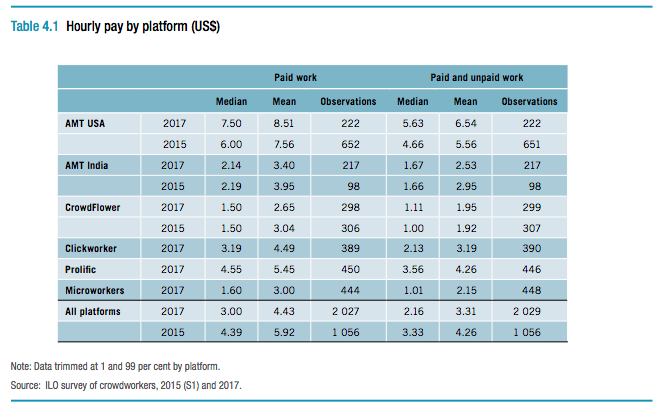Microtask platforms recruit humans to do the rating, tagging, review-writing, and poll-taking work that can't quite be automated with an algorithm yet. In the US, the most common such platform is Amazon's Mechanical Turk, but other platforms are prominent in other parts of the world.
Proponents of this kind of work say that these quick, simple tasks allow people flexible hours to make money, or help "fill in the gaps" for the un- and under-employed.
But a new study (PDF) from the United Nations' International Labor Organization (ILO) questions whether these platforms are as good for society as the Silicon Valley investors and digital evangelists claim. The ILO surveyed 3,500 people across 75 countries who worked for Mechanical Turk, as well as Crowdflower, Clickworker, Prolific, and Microworker.
The work on these platforms is often menial and tedious, and the survey found that workers get paid startlingly little on all five platforms, especially when unpaid work is taken into account. The survey counted unpaid work as "time spent looking for tasks, earning qualifications, researching requesters through online forums, communicating with requesters or clients and leaving reviews, as well as unpaid/rejected tasks/tasks ultimately not submitted."
In the US, accounting for all paid and unpaid work, Mechanical Turk workers made just $6.54 per hour on average, with a median of $5.63 per hour. That's significantly lower than the minimum wage in most states, and lower than the federal minimum wage of $7.25 per hour.
And around the world, workers were invariably paid less than US microtask workers. The average hourly pay for all workers across the five platforms was just $3.31 (and that includes the US' relatively "high" wages!) with a median hourly pay of $2.16. This doesn't necessarily reflect a tendency for lower wages in poorer countries, either. The UN survey showed "that a substantial proportion of workers earn below their local minimum wage."

The ILO found that microtask platforms also made poor use of worker skills, and in some cases, made it harder for people to find full-time employment later on, because prospective employers noticed a gap in more formal types of employment. And microtask workers across the globe are generally well-educated: "around 37 percent had a bachelors degree and 20 percent had a postgraduate degree," the ILO wrote, and more had technical certifications. "Among degree holders, 57 percent were specialized in science and technology… an additional 25 per cent were specialized in economics, finance, and accounting."
Unethical task requesters
Several platforms also gave workers little recourse if they began a task and then for some reason that task was cancelled. Although the hours had been put in, the worker would not get paid. Additionally, some of the five platforms studied had no guidelines for the kinds of work that could be requested, opening workers up to psychologically traumatic situations.
Several of the microtask platforms that were studied were used for social media content moderation. That is a particularly arduous task that is poorly compensated, the ILO says:
The difficulty of this work is compounded by the working conditions of the workers who are typically hired as contractors rather than as regular full-time employees and do not receive training or psychological support for the work they are carrying out. This is problematic given that constant exposure to violent content can place a long-term psychological toll on individuals, often resulting in symptoms that resemble those of post-traumatic stress disorder (PTSD), such as insomnia, nightmares, anxiety or hallucinations. The seriousness of the problem has not received sufficient attention by many technology companies.
The ILO also questioned the larger purpose of microtask work. "Many microtasks are simple and repetitive, and some are ethically questionable…for example, tasks that involve providing fake reviews," the ILO writes. Task requesters may even be cheating workers by underestimating the amount of time it would take to complete a task. One example in the report identified a task providing fake reviews for a Father's Day mug online. "Though the task summary mentions that the task takes less than 3 minutes, in reality, following the instructions, it would take at least 5 minutes to finish the task, not taking into consideration searching for the task and providing proof that the task was completed," ILO wrote.
Especially in developing countries, microtask work doesn't seem to help the country's economy. "Is this the best use of developing countries skilled labor?" the ILO asks. "The risk is that crowdwork, particularly microtask work, has the potential of deskilling work and also displacing or replacing some forms of skilled labour with unskilled labour, as jobs tend to be broken down into smaller tasks."
"Without any rights or a system of collective bargaining, microwork exploits the work of qualified people in a developing country," the ILO concludes.
[contf] [contfnew] 
Ars Technica
[contfnewc] [contfnewc]





![Did The French Want The Statue Of Liberty To Stand For Immigration? [VIDEO]](https://amsterdamtimes.info/wp-content/uploads/2018/05/tim-kaine-e1526684440745-100x75.png)
